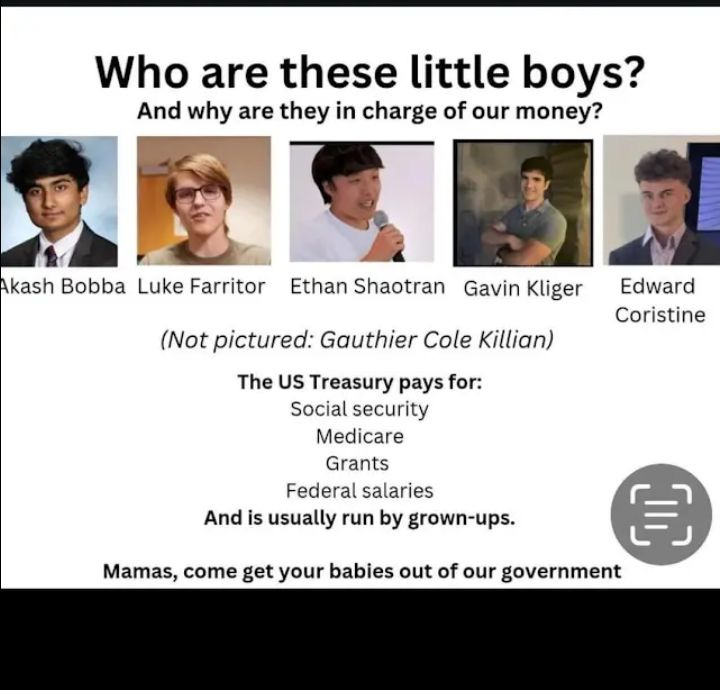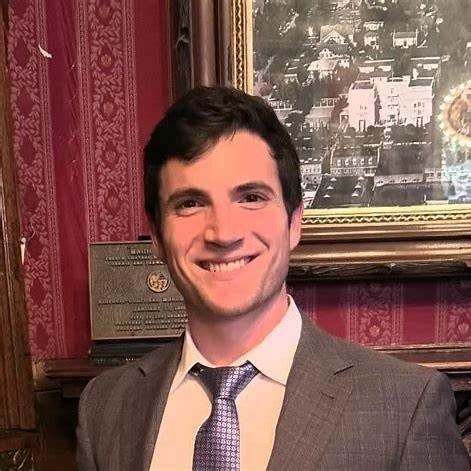The Department of Government Efficiency (DOGE) Team
Who is Akash Bobba, Luke Farrator, Ethan Shaotran, Gavin Kliger, Edward Coristine, & Gauthier Cole Killian?
The Department of Government Efficiency (DOGE) Team:
Who is Akash Bobba, Luke Farrator, Ethan Shaotran, Gavin Kliger, Edward Coristine, & Gauthier Cole Killian?
Akash Bobba is a 22-year-old engineer of Indian origin who has recently gained attention for his role in Elon Musk's Department of Government Efficiency (DOGE). He graduated from the University of California, Berkeley, where he participated in the prestigious Management, Entrepreneurship, and Technology (MET) program. During his time at Berkeley, Bobba secured internships with prominent companies such as Meta, Palantir, and Bridgewater Associates, working on projects involving artificial intelligence, data analytics, and financial modeling.
Bobba's recruitment into DOGE, along with five other young engineers aged between 19 and 24, has sparked controversy due to their unprecedented access to highly sensitive government systems. Critics have raised concerns about their limited experience in government operations and the potential risks associated with granting them high-level security clearances.
Despite the controversy, Bobba's academic and professional achievements have been noteworthy. He was recognized as a top student at UC Berkeley and participated in the MET program, which is designed to groom future leaders in the tech industry. His internships at major companies provided him with valuable experience in artificial intelligence, data analytics, and financial modeling, helping him make a name for himself in Silicon Valley.
One notable incident from his time at Berkeley involved Bobba rewriting an entire project overnight after a teammate accidentally deleted the code, demonstrating his remarkable problem-solving abilities and resilience under pressure.
In summary, while Akash Bobba's rapid ascent into a significant governmental role has been met with both admiration and concern, his academic excellence and professional experiences underscore his capabilities as a young engineer.
Luke Farritor is a computer science student at the University of Nebraska–Lincoln, recognized for his groundbreaking work in deciphering ancient texts using artificial intelligence. In late 2023, he became the first individual to decode a Greek word from a nearly 2,000-year-old scroll that had been carbonized during the eruption of Mount Vesuvius in A.D. 79. This achievement earned him a $40,000 prize from the Vesuvius Challenge, an international competition aimed at reading these charred scrolls.
Building on this success, Farritor collaborated with Youssef Nader and Julian Schilliger to further decipher the scrolls. Their combined efforts led to the extraction of 15 passages, totaling over 2,000 characters, from digital scans of a seared scroll. This accomplishment secured them the Vesuvius Challenge's $700,000 Grand Prize in early 2024.
Farritor's approach involved developing and training a machine-learning model capable of detecting subtle differences in the texture of the carbonized scrolls, which indicated the presence of ink and Greek letters. By segmenting the rolled-up papyrus into coherent fragments, his model successfully identified and reconstructed portions of the ancient text.
Beyond his work with ancient texts, Farritor has demonstrated a keen interest in applying technology to various fields. He engineered a musical solution for an art exhibit, showcasing his versatility and innovative thinking.
For more information about Luke Farritor and his projects, you can visit his personal website.
To learn more about his achievements in the Vesuvius Challenge, you can watch the following video:
Ethan Shaotran is an American software engineer and author, currently serving in the Department of Government Efficiency (DOGE). He hails from Palo Alto, California, and graduated from Gunn High School in 2020. As of 2025, he is a senior at Harvard University, majoring in computer science. During his time at Harvard, Shaotran founded Energize AI, an artificial intelligence startup, and developed "Spark," an AI-driven scheduling assistant. His work on Spark earned him a $100,000 grant from OpenAI.
In addition to his entrepreneurial endeavors, Shaotran has contributed to academic research. He co-authored a paper titled "Gesture Learning For Self-Driving Cars," which was presented at the 2021 IEEE International Conference on Autonomous Systems.
In 2025, Shaotran was appointed to the Department of Government Efficiency (DOGE), a team of young engineers tasked with modernizing government operations. According to reports, he holds an active General Services Administration (GSA) email and A-suite level clearance, granting him access to GSA facilities and IT systems.
For more insights into his perspectives on artificial intelligence, you can watch his talk titled "Ethan Shaotran on The Actual Risks of Generative AI":
Gavin Kliger is an American software engineer currently serving as a special adviser to the director for information technology at the United States Office of Personnel Management (OPM) and within the Department of Government Efficiency (DOGE). He graduated from the University of California, Berkeley, in 2020 with a degree in Electrical Engineering and Computer Sciences (EECS).
Following his graduation, Kliger worked as a software engineer at LinkedIn and later at Databricks, an AI company.
In early 2025, Kliger was appointed to DOGE, a team of young engineers tasked with modernizing federal technology and software to enhance governmental efficiency. On February 3, 2025, he sent an email from a United States Agency for International Development (USAID) address, instructing all USAID employees to work from home and not come into the office. This action was met with criticism from USAID personnel and Democratic politicians, including Senator Chris Coons, who accused the Trump administration of attempting to dismantle the agency.
Kliger has also been active on Substack, where he launched a platform in December 2024 to share political commentary. His posts include titles such as "The Curious Case of Matt Gaetz: How the Deep State Destroys Its Enemies" and "Pete Hegseth as Secretary of Defense: The Warrior Washington Fears."
For more insights into his perspectives, you can visit his Substack platform.
Edward Coristine is a 19-year-old American software engineer currently serving in the Department of Government Efficiency (DOGE). He graduated from Rye Country Day School in 2024 and is currently enrolled at Northeastern University. In the summer of 2024, Coristine interned at Neuralink, Elon Musk's brain-computer interface company.
Within DOGE, Coristine holds the title of "expert" at the Office of Personnel Management (OPM), reporting directly to Amanda Scales, the agency's chief of staff. His role has involved participating in meetings where federal employees were asked to review their work and justify their positions.
Notably, Coristine has used the moniker "Big Balls" on LinkedIn and the handle @Edwardbigballer on X (formerly Twitter). These usernames have drawn attention and criticism, given his significant responsibilities within the federal government.
Coristine's rapid ascent into a federal role has raised concerns due to his limited experience and young age. Critics argue that such appointments may undermine the effectiveness and integrity of government operations.
Gauthier "Cole" Killian is an American software engineer currently involved with the Department of Government Efficiency (DOGE), a team tasked with modernizing federal technology and software. According to internal records reviewed by WIRED, he is listed as a volunteer within DOGE and has an active email associated with the department.
Killian graduated from high school in 2019 and attended McGill University through at least 2021. A now-deleted résumé obtained by WIRED indicates that he worked as an engineer at Jump Trading, a firm specializing in algorithmic and high-frequency financial trades.
His rapid ascent into a federal role has raised concerns due to his limited experience and young age. Critics argue that such appointments may undermine the effectiveness and integrity of government operations.









